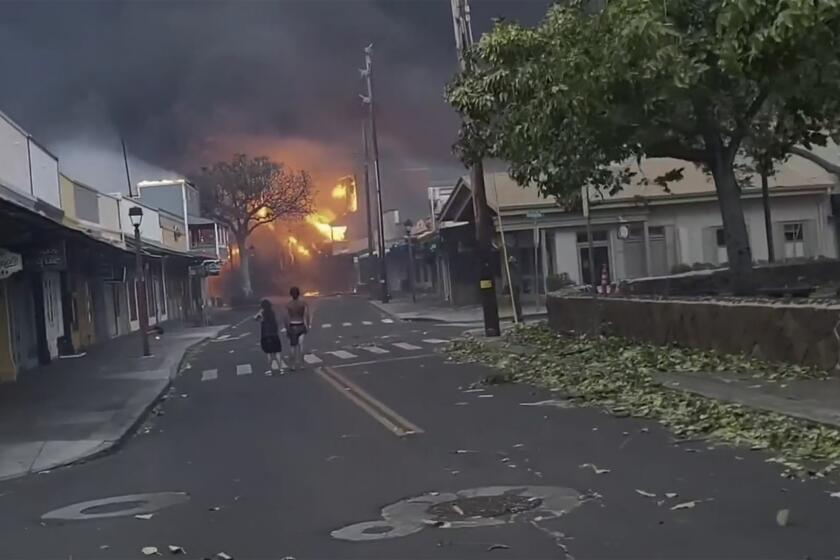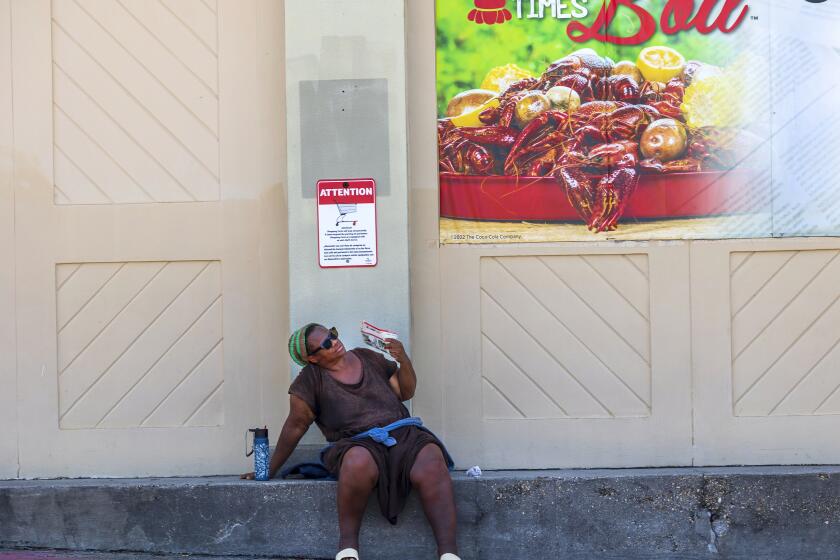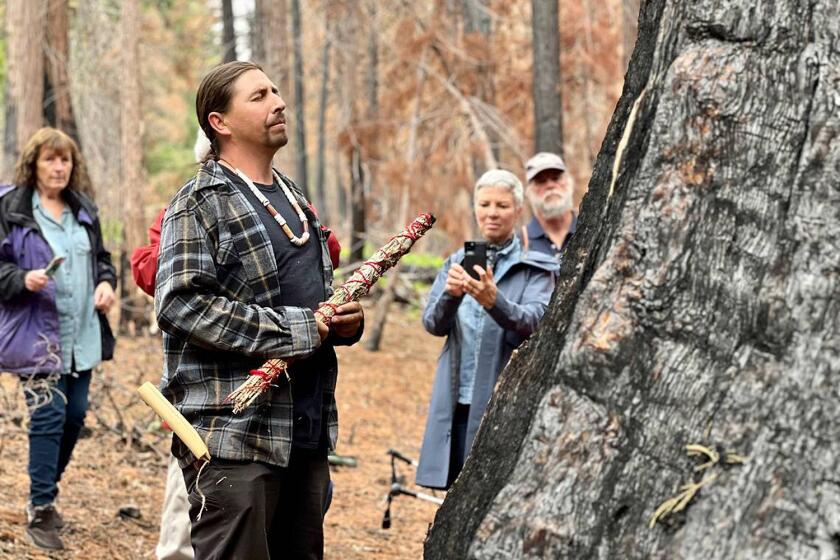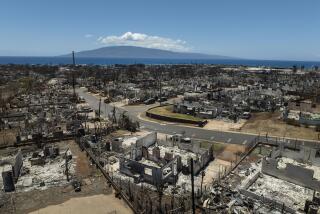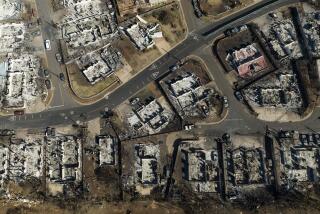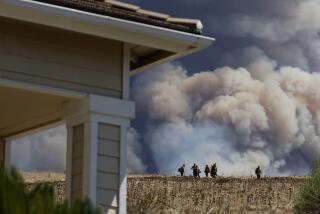‘A scar on the face of Maui’: Lahaina is gutted; fatalities expected to multiply
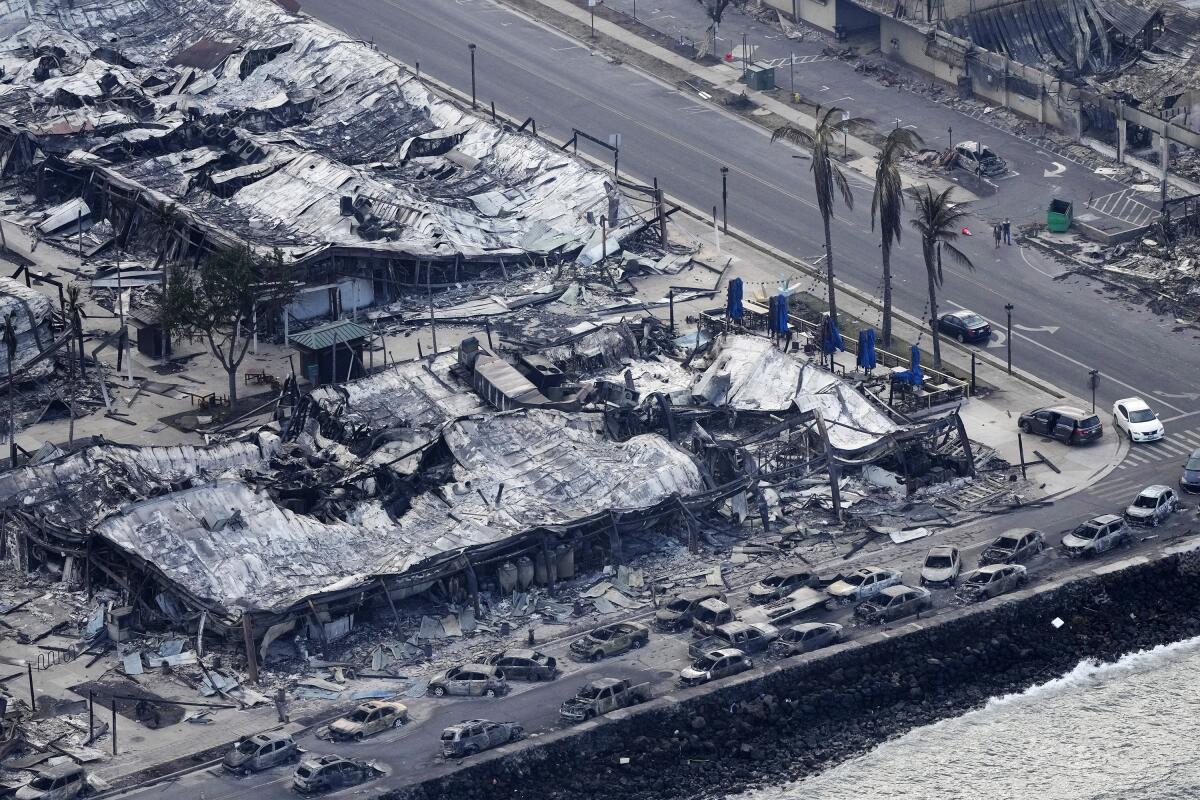
At least 53 people have died, dozens have been injured and hundreds of structures have been destroyed as fires have torn through Maui this week, forcing thousands to flee their homes and reducing much of the historic town of Lahaina to ash.
“What we saw was likely the largest natural disaster in Hawaii state history,” Gov. Josh Green said in a public briefing Thursday.
Green issued a fourth emergency proclamation Thursday night to expedite aid to the western Maui communities devastated by the fires. The Lahaina wildfire raced with such speed that some of those fleeing jumped into the ocean to escape the flames and later were rescued by the Coast Guard.
Maui County officials said Thursday afternoon that at least 53 had died in the Lahaina fire, and the death toll was expected to increase in the coming days. One Lahaina resident, Tiffany Kidder Winn, saw a row of burned-out vehicles in the road, some of which contained charred bodies.
“It looked like they were trying to get out but were stuck in traffic and couldn’t get off Front Street,” she told the Associated Press, referring to the seafront roadway that was the site of multiple retail shops and restaurants.
An estimated 1,700 structures were damaged or destroyed by wildfire, including many small businesses, a church and a school, according to Gov. Green.
“Right now, we have a scar on the face of Maui that will be here for a very long time,” said Maui Police Chief John Pelletier. “Scars heal in time, but they always remain.”
Green said Thursday he expected the cost of the recovery to be in the “billions of dollars.” Accuweather had a preliminary estimate of damage and economic loss at $8 billion to $10 billion.
Three blazes — the Lahaina, Pulehu and Upcountry fires — remained active Thursday, officials said. None of the fires had been fully contained by 3 p.m. Hawaiian time Thursday, according to Maui Fire Chief Bradford Ventura.Officials said they were still battling flare-ups and that two C-47 National Guard helicopters were standing by for deployment.
“This is a deeply somber day,” Maui Mayor Richard Bissen Jr. said. “The gravity of losing any life is tragic. As we grieve with their families, we offer prayers for comfort in this inconsolable time.”
President Biden on Thursday declared “a major disaster” in the island state, opening the door to federal funding and state and local recovery efforts. Residents affected by the fires can apply for “grants for temporary housing and home repairs, low-cost loans to cover uninsured property losses” and other federal programs for business owners and residents, the White House said in a statement. The declaration also makes federal funding available to state and eligible local governments and certain private nonprofit organizations.
The wildfire that ripped through Maui devastated Lahaina, a town boasting centuries of history and that was once the capital of the Hawaiian kingdom.
At least 11,000 travelers were evacuated from Maui, officials said. The fires overpowered and closed many roads, which became congested and stranded hundreds of people as they raced to the island’s only major airport, Kahului. About 1,400 people stayed overnight at the airport, and many more were expected to arrive Thursday. Airlines have said they are adding more flights, reducing ticket prices and deploying bigger planes to aid evacuation efforts.
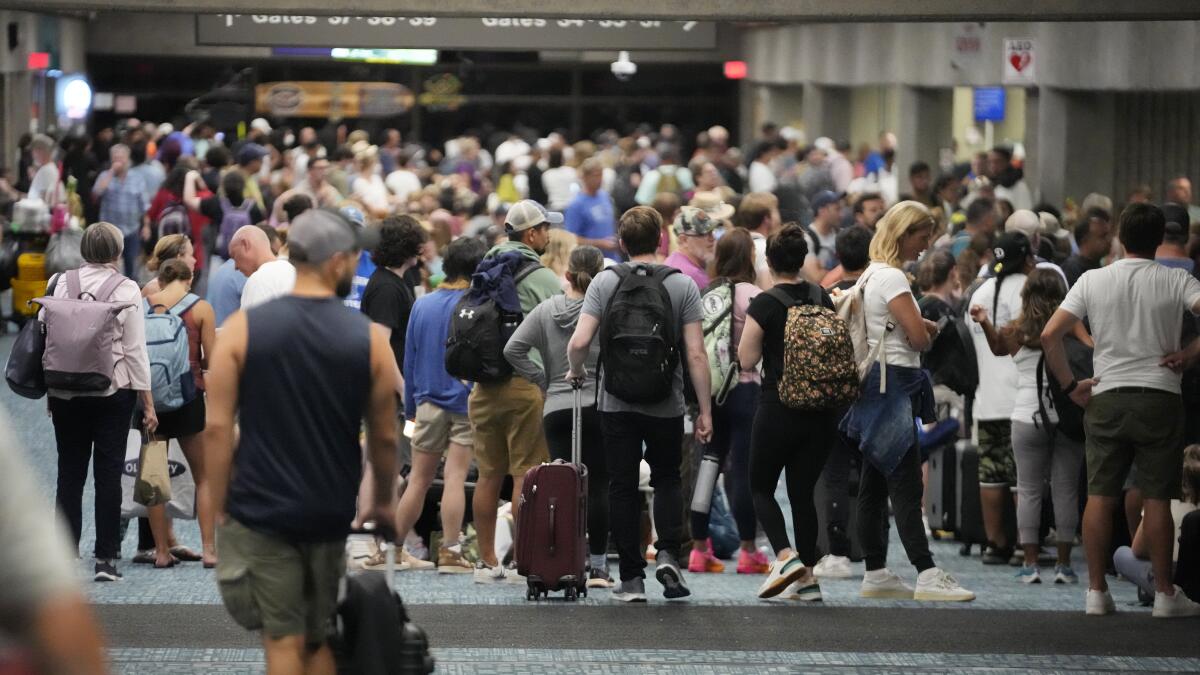
As winds diminished Wednesday, some aircraft resumed flights, enabling pilots to view the full scope of the devastation. Flyovers of the coastal town of Lahaina by U.S. Civil Air Patrol and the Maui Fire Department showed the extent of the loss, said Mahina Martin, a spokesperson for Maui County.
Aerial video showed dozens of homes and businesses flattened, including on Front Street, where tourists once gathered to shop and dine. Smoking heaps of rubble lay piled high next to the waterfront, boats in the harbor were scorched, and gray smoke hovered over the leafless skeletons of charred trees.
Rebuilding the local economy could take years, Lt. Gov. Sylvia Luke said, adding that the blazes remade the landscape, from destroying homes and businesses to taking down infrastructure and broadband capabilities. “It will be a long road to recovery,” she said.
An estimated 2,000 people have stayed in at least six shelters that have opened for evacuees, according to reports. The Red Cross said that some residents sought shelter overnight while others had visited during the day, seeking resources. State officials said the decision on when to allow residents to return to their homes would be made by Maui County officials and Mayor Bissen.
Although the rest of the state remains open, officials have asked visitors — a huge economic force — to leave Maui and urged others making nonessential trips to stay away from the island.
The airport was overrun with people trying to catch flights Thursday. Many major airlines do not offer short-distance flights between the Hawaiian islands, but carriers with major business on the island said they were doing what they could to respond to evacuation efforts and get passengers to the mainland.
The two largest airlines operating in Hawaii — Hawaiian Airlines and Southwest — have reduced fares to just $19 for flights leaving from Kahului to Honolulu International Airport on Oahu, where the Red Cross had opened shelters for evacuees.
Alaska Airlines said it would continue to operate its eight daily scheduled departures from Maui and also added a “rescue flight” Thursday to ferry more people off the island.
American Airlines said it was also adding flights out of Maui and upgrading planes to provide more seats.
United canceled flights to Kahului on Thursday so that planes could fly empty to Maui to return passengers to the mainland more readily.
Floods, fires, extreme heat, awful air quality, warming seas: As extreme weather engulfs the nation, the United States resembles a disaster movie set.
West Maui remained without cell or landline phone service or electricity, the county said. Officials were working to restore power to some 10,000 homes that remained without electricity Thursday.
The exact cause of the blaze couldn’t be determined, but a number of factors including high winds, low humidity and dry vegetation likely contributed, said Maj. Gen. Kenneth Hara, adjutant general for the Hawaii State Department of Defense. The weather service had issued a red flag warning — which indicates warm temperatures, very low humidity and stronger winds are expected to combine to produce an increased risk of fire danger — but Hara said wind strength far exceeded the predictions, which were expected to be around 50 to 55 mph but shot up to 85 mph.
Experts also said climate change is increasing the likelihood of more extreme weather.
An update from the National Drought Monitor early Thursday showed drought levels increased across the state from 6% to 14% in the last week. Maui County in particular saw an increase in severe drought conditions, from about 6% last week to 16% this week.
Clay Trauernicht, a fire scientist at the University of Hawaii at Mānoa, said in a tweet that while a nearby hurricane played a role, the problem lies largely with widespread “unmanaged, nonnative grasslands” from “decades of declining agriculture.”
“The transformation to savanna makes the landscape way more sensitive to bad ‘fire weather’ — hot, dry, windy conditions,” Trauernicht said. “It also means we get huge buildups of fuels during rainy periods.”
Hara said he was “personally surprised by the amount of fires.” At least three blazes burned across Maui: in Lahaina, south Maui’s Kihei area and the mountainous and inland communities known as Upcountry.
Firefighters dropped 150,000 gallons of water Wednesday, but high winds obstructed their efforts.
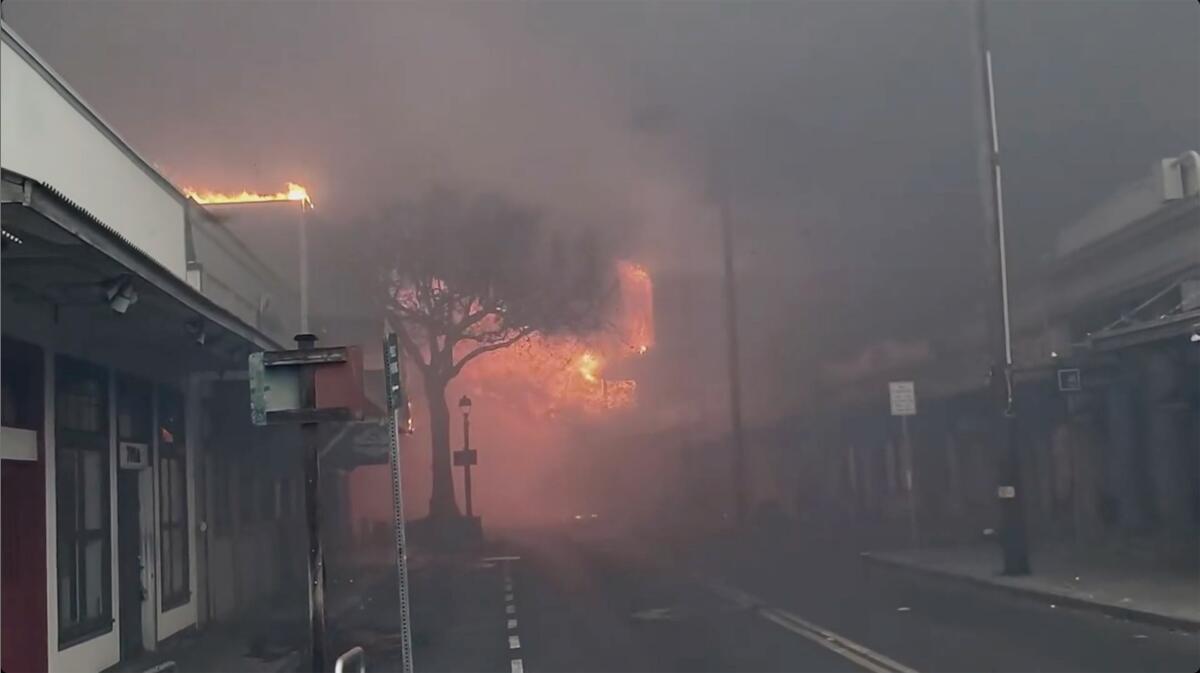
In the upcountry Kula area, at least two homes were destroyed Tuesday in a fire that engulfed about 1.7 square miles, Bissen said.
There have been no reports of injuries or homes lost to three wildfires burning on Hawaii’s Big Island, Mayor Mitch Roth said Wednesday. Firefighters did extinguish a few roof fires.
The National Weather Service said Hurricane Dora, which was passing to the south of the island chain at a safe distance of 500 miles, was partly to blame for gusts above 60 mph that knocked out power, rattled homes and grounded firefighting helicopters.
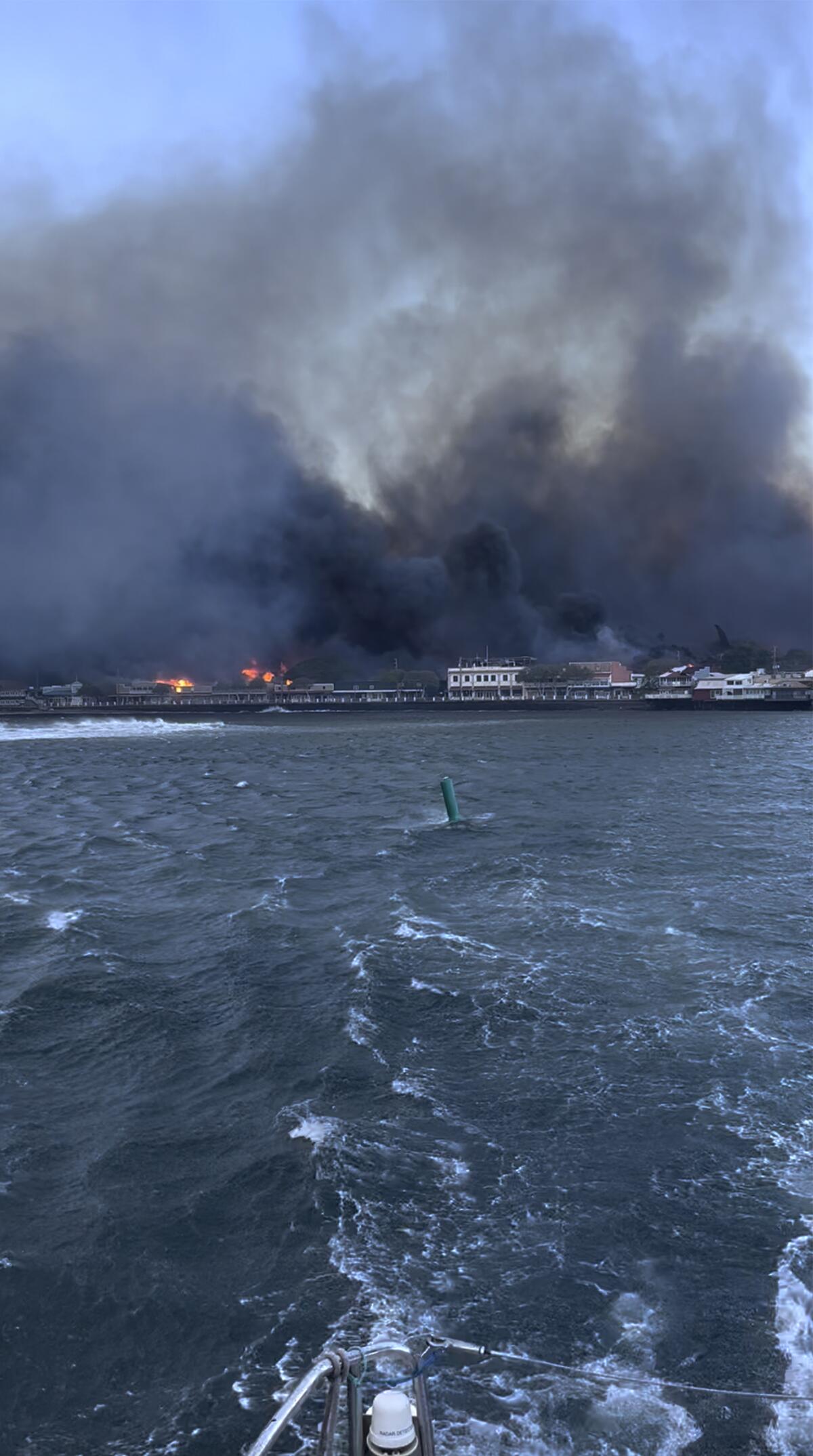
Luke activated the Hawaii National Guard to assist. Biden said the Coast Guard and Navy were supporting the response and rescue efforts, while the Marines were providing Black Hawk helicopters to fight the fires.
“Local people have lost everything,” said James Tokioka, director of the Department of Business, Economic Development and Tourism. “They’ve lost their house, they’ve lost their animals.”
Former President Obama, who was born in Hawaii, said on social media Wednesday evening that it was tough to see some of the images coming out of a place that is so special to many.
“Michelle and I are thinking of everyone who has lost a loved one, or whose life has been turned upside down,” he said.
Ke’eaumoku Kapu, the owner of the Na Aikane o Maui cultural center in Lahaina, said he and his wife didn’t have time to pack up anything before being forced to flee. “We had years and years of research material, artifacts,” he said.
Record heat. Raging fires. What are the solutions?
Get Boiling Point, our newsletter about climate change, the environment and building a more sustainable California.
You may occasionally receive promotional content from the Los Angeles Times.
Alan Dickar said he wasn’t sure what remained of his Vintage European Posters gallery, which was a fixture on Front Street in Lahaina for 23 years. Before evacuating with three friends and two cats, Dickar recorded video of flames engulfing the main strip of shops and restaurants frequented by tourists.
“Every significant thing I owned burned down today,” he said.
A controlled burn in Calaveras Big Trees State Park has badly damaged a pair of giant sequoias named ‘the Orphans,’ outraging community members.
Lahaina is often thought of as just a Maui tourist town, said Tiare Lawrence, who lives nearby and had relatives evacuate to her home, but “we have a very strong Hawaiian community.”
“I’m just heartbroken,” she said. “Everyone’s lives have tragically changed in the last 12 hours.”
The Associated Press contributed to this report.
More to Read
Sign up for Essential California
The most important California stories and recommendations in your inbox every morning.
You may occasionally receive promotional content from the Los Angeles Times.
